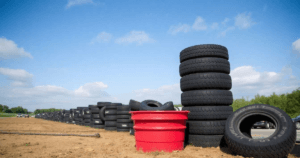Environment Agency Launches Urgent Review into Tyre Recycling Practices: 3 Shocking Findings Revealed
The Environment Agency (EA) has initiated a thorough review of the UK’s tyre export practices to India following a BBC investigation. The probe uncovered that millions of tyres, instead of being recycled, were being sent to makeshift furnaces in India, where they are burned for materials like steel and carbon black. These operations pose serious health and environmental risks, including toxic fumes and pollution. A tragic explosion at a plant in January, which killed four people, highlighted the dangers.
The EA has committed to investigating the claims and has asked for more evidence from the BBC. The Department for the Environment, Food & Rural Affairs (Defra) is also involved, aiming to address potential criminal activity linked to the tyre exports. Environmental group Fighting Dirty has welcomed the review but urges stronger actions. The issue underscores the need for stricter controls over waste management practices.

Environment Agency Launches Urgent Review into Tyre Recycling Practices: 3 Shocking Findings Revealed
The Environment Agency (EA) has initiated a comprehensive review of how waste tires from the UK are exported to India, following a BBC investigation that exposed dangerous and unethical practices. The probe revealed that millions of tires, originally marked for recycling, were instead shipped to unregulated facilities in India. There, they were burned in temporary, unsafe furnaces to extract materials such as steel, oil, and carbon black—a substance used in products like ink and rubber. This process, often conducted in poorly managed plants, releases toxic fumes and pollutants, posing severe risks to both the environment and public health.
The BBC’s findings highlighted how these operations bypass proper recycling methods. Instead of being broken down safely, tires are incinerated in open-air furnaces or poorly ventilated facilities, releasing harmful chemicals into the air, soil, and water. Local communities near these sites in India have reported alarming health issues, including chronic coughs, eye irritation, and respiratory problems. One resident described the pollution as “unbearable,” with thick black smoke often blanketing villages.
A tragic incident in January 2024 underscored the dangers of these practices. An explosion at a tire-processing plant in Maharashtra, India, killed four workers and injured several others. The blast was linked to unsafe handling of materials during the burning process. This event drew attention to the lack of safety protocols and oversight in these facilities, which frequently operate without proper permits or equipment.
In response to the BBC’s evidence, the EA announced it would reassess its regulations governing tire exports. The agency has requested detailed information from the BBC to aid its investigation, emphasizing the need to ensure UK waste is disposed of responsibly overseas. Meanwhile, the Department for Environment, Food & Rural Affairs (Defra) has vowed to collaborate with law enforcement to probe potential criminal violations, such as illegal waste trafficking or false labeling of shipments.
Environmental activists have long warned about the global trade in hazardous waste. The group Fighting Dirty, which campaigns against unethical waste disposal, called the EA’s review “a critical first step” but stressed that stronger measures are needed. They argue that UK authorities must tighten export controls, penalize companies involved in illegal practices, and promote genuine recycling solutions within the country. “Shipping waste abroad isn’t a solution—it’s outsourcing harm,” a spokesperson said.
The problem stems partly from the UK’s limited capacity to recycle tires domestically. Over 40 million tires are discarded annually in the UK, but only a fraction are processed sustainably. Many are exported to developing nations with lax environmental laws, where costs are lower, and regulations are easily bypassed. While UK exporters claim tires are sent abroad for “recycling,” the BBC’s footage showed tires being burned outright—a method banned in the UK due to its environmental impact.
Burning tires releases carcinogens like benzene and heavy metals, contaminating air and water supplies. In India, these toxins have devastated local ecosystems, killing crops and polluting rivers. Health workers in affected areas report rising cases of lung disease and skin conditions, particularly among children and the elderly. “We’re breathing poison every day,” said one farmer, whose land sits near a tire-burning site.
The EA’s review could lead to stricter export rules, potentially requiring companies to prove that overseas facilities meet environmental and safety standards. Critics, however, argue that enforcement remains weak. Without rigorous checks, waste may continue to flow to unscrupulous operators. Fighting Dirty has urged the UK to invest in domestic recycling infrastructure, reducing reliance on exports altogether.
This issue also raises ethical questions about global waste trade. Developed nations often ship hazardous materials to poorer countries, where communities lack the resources to resist or regulate such industries. The BBC’s investigation has reignited debates about environmental justice and the need for international agreements to hold countries accountable for their waste.
For now, the EA’s actions signal a growing recognition of the problem. But campaigners warn that without swift, decisive action—including prosecuting rule-breakers and supporting sustainable alternatives—the cycle of harm will persist. As one advocate put it, “Recycling shouldn’t mean burning trash in someone else’s backyard.” The outcome of the EA’s review will likely shape the UK’s role in the global waste economy and its commitment to ethical environmental practices.
You must be logged in to post a comment.